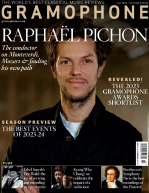Texte paru dans: / Appeared in: |
|
 Recording of the month
Recording of the month |
Outil de traduction |
|
This has to be one of the most gripping and impactful recordings of Monteverdi’s Vespers of 1610 available right now. It is bursting with energy and passion at every opportunity. Recorded in January 2022 at the Temple du Saint-Esprit in Paris, it’s the long-awaited studio recording that Lindsay Kemp referred to when reviewing Pygmalion’s live pre-pandemic DVD performance from the Versailles Royal Chapel. That this new album is so lived-in and confident is surely testament to the many concert performances that preceded it: in fact, the booklet contains a fascinating conversation between director Raphaël Pichon and the Rector of Bordeaux Cathedral, JeanClément Guez, who hosted several performances in ‘spatialised son et lumière versions’. There is more to this story: as Alexandra Coghlan described in her interview with the conductor in the October issue, Pichon has a long relationship with Monteverdi’s Vespers, and this is clear from the fluidity of ideas and gestures captured on this recording.
‘That this new album is so lived-in and confident is surely testament to the many concert performances that preceded it’ The Vespers are presented, as on the DVD, with the insertion of ‘Sancta Maria succurre miseris’ (SV328) from Promptuarium musicum (1627) before the famous Sonata sopra Sancta Maria, and this recording also retains Pygmalion’s reprise of the opening falsobordone ‘Domine ad adiuvandam’ to the Tenor Zachary Wilder boasts superb ornaments, including a ine trillo words of the concluding versicle and responsory ‘Domine exaudi orationem meam’, which, in Pichon’s words, ‘serves to exalt the feeling of the road travelled and the manifest sign of a new beginning’. And it certainly is a long road travelled, made more so, perhaps, by the fact that Pichon eschews low transpositions for the ‘Lauda Jerusalem’ and Magnificat a 7 – for which Andrew Parrott has so eloquently argued – preferring the excitement and sense of reach (over-reach?) implied by using high voices. In a way I’m sorry not to hear what Pichon’s incredible energy would bring to the chiavette situation, but I’m not unduly worried since this new recording presents a dazzling, bright performance, utterly convincing but still challenging since it operates just outside what I had previously considered to be the catchment area of liturgical sensibilities. I find this troubling in a good way, as it forces me to examine my preference for prayerful, pristine performances. For many years I have been transfixed by the sheer beauty and richness of René Jacobs and Concerto Vocale and found it a wonderful companion to Andrew Parrott’s liturgical approach with the smaller ensemble of the Taverner Consort. Parrott first introduced me to the idea that this work could be either a complete sequence or a set of Vespers resources, and now Pichon brings an Orfeo-esque sense of drama that I find to be another valuable approach.
Pichon’s brisk and festive opening immediately highlights the quality of his instrumentalists’ playing, from cornett flourishes to busy, churning continuo textures. The choir have excellent diction: their half-whispered opening of
‘Dixit Dominus’ is as gripping as their taut and animated chanting later in the same psalm on ‘Ex utero ante luciferum’ and ‘Confregit in die irae’, which accelerates thrillingly. Similarly, ‘Laetatus sum’ is characterised by superb choral singing in the lesser doxology. I find the different approaches to the ‘Gloria Patri’ sections on this disc are each joyful, but here the colourful collision of ornaments on the final ‘Amen’ is especially earcatching. The soloists are superb throughout: Céline Scheen and Perrine Devillers are well matched in ‘Pulchra es’ and they are supported by a particularly luscious bed of plucked strings. But my attention returned again and again to the tenors in ‘Duo Seraphim’, Emiliano Gonzalez Toro, Zachary Wilder and Antonin Rondepierre, who boast a fine trillo. There are so many thoughtful touches where this trio are concerned: listen in particular for the treatment of ‘Et hi tres unum sunt’ (‘and these three are one’). Speaking of vocal ornaments, there is a superb inflection from Wilder in ‘Audi coelum’.
One small reservation I have is that in such a generally high-octane performance, one or two of the calmer choral moments are taken too slowly to either maintain a strong connection to the text or provide a counterbalance to the more frenetic moments: I’m thinking of the fifth verse of the Magnificat in particular. I hotly suspect that these slow tempos are spine-chilling in live performance but for me they just don’t come across on a recording. The opposite is true of reprising the opening music for the concluding versicle and responsory, which, in my opinion, works well.
This recording is hugely welcome and will take a much-deserved place in my personal pantheon of greats. If you have any doubts, just listen to the zippy recorder-playing in the Magnificat’s ‘Fecit potentiam in bracchio suo’ – a flamboyant Mantuan moment that will surely stir the hardest of hearts. |
|




